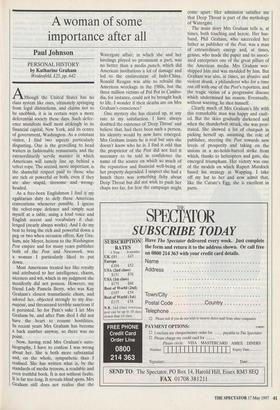A woman of some importance after all
Paul Johnson
PERSONAL HISTORY by Katharine Graham Weidenfeld, £25, pp. 642 Although the United States has no class system like ours, ultimately springing from legal distinctions, and claims not to be snob ish, it is in certain ways a more deferenti I society these days. Such defer- ence manifests itself most strikingly in its financial capital, New York, and its centre of government, Washington. As a constant visitor, I find two aspects particularly disgusting. One is the grovelling to head waiters in fashionable restaurants, and the extraordinarily servile manner in which Americans will tamely line up behind a velvet rope. The second, more important, is the shameful respect paid to those who are rich or powerful or both, even if they are also stupid, tiresome and wrong- headed.
As a free-born Englishman I find it my egalitarian duty to defy these American conventions whenever possible. I ignore the velvet-rope defence and simply seat myself at a table, using a loud voice and English accent and vocabulary if chal- lenged (nearly always works). And I do my best to bring the rich and powerful down a peg or two when occasion offers. Kay Gra- ham, née Meyer, heiress to the Washington Post empire and for many years publisher both of the Post and Newsweek, was a woman I particularly liked to put down.
Most Americans treated her like royalty and attributed to her intelligence, charm, niceness and wit, which in my judgment she manifestly did not possess. However, my friend Lady Pamela Berry, who was Kay Graham's closest transatlantic chum, and adored her, objected strongly to my lese- majeste, and threatened terrible sanctions if it persisted. So for Pam's sake I let Mrs Graham be, and after Pam died I did not have the heart to resume hostilities. In recent years Mrs Graham has become a back number anyway, so there was no point.
Now, having read Mrs Graham's auto- biography, I have to confess I was wrong about her. She is both more substantial and, on the whole, sympathetic than I realised. She has written what is, by the standards of media tycoons, a readable and even truthful book. It is not without faults. It is far too long. It reveals blind spots. Mrs Graham still does not realise that the Watergate affair, in which she and her hirelings played so prominent a part, was no better than a media putsch, which did American institutions a lot of damage and led to the enslavement of Indo-China. Ronald Reagan was able to rebuild the American wreckage in the 1980s, but the three million victims of Pol Pot in Cambo- dia, for instance, could not be brought back to life. I wonder if their deaths are on Mrs Graham's conscience?
One mystery she has cleared up, at any rate to my satisfaction. I have always doubted the existence of 'Deep Throat' and believe that, had there been such a person, his identity would by now have emerged. Mrs Graham insists he is real but says she doesn't know who he is. I find it odd that the proprietor of the Post did not feel it necessary to be told in confidence the name of the source on which so much of the reputation and financial well-being of her property depended. I suspect she had a hunch there was something fishy about Deep Throat but did not wish to push her chaps too far, for fear the campaign might come apart. Her admission satisfies me that Deep Throat is part of the mythology of Watergate.
The main story Mrs Graham tells is, at times, both touching and heroic. Her hus- band, Phil Graham, who succeeded her father as publisher of the Post, was a man of extraordinary energy and, at times, genius, who made the paper and its associ- ated enterprises one of the great pillars of the American media. Mrs Graham wor- shipped him and was moulded by him. But Graham was also, at times, an abusive and violent drunk, a philanderer who for a time ran off with one of the Post's reporters, and the tragic victim of a progressive disease which undermined his reason. Eventually, without warning, he shot himself.
Clearly much of Mrs Graham's life with this remarkable man was happy and exalt- ed. But the skies gradually darkened and when the thunderbolt struck, she was pros- trated. She showed a lot of chutzpah in picking herself up, assuming the role of publisher, steering the Post towards new levels of prosperity and taking on the unions in a no-holds-barred strike from which, thanks to helicopters and guts, she emerged triumphant. Her victory was one of the models on which Rupert Murdoch based his strategy at Wapping. I take off my hat to her and now admit that, like the Curate's Egg, she is excellent in parts.


































































 Previous page
Previous page